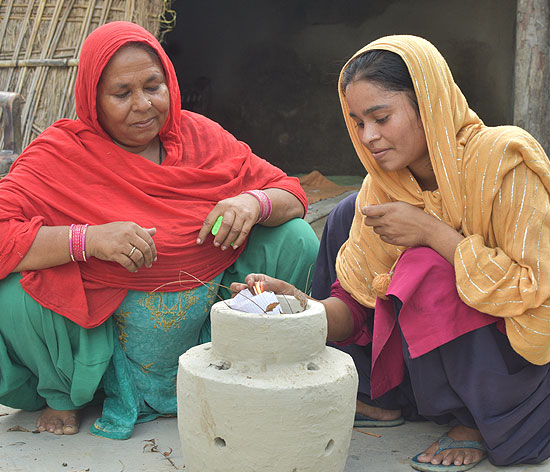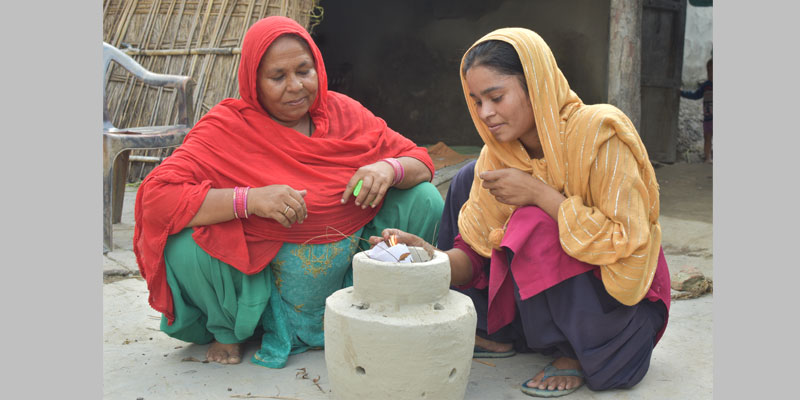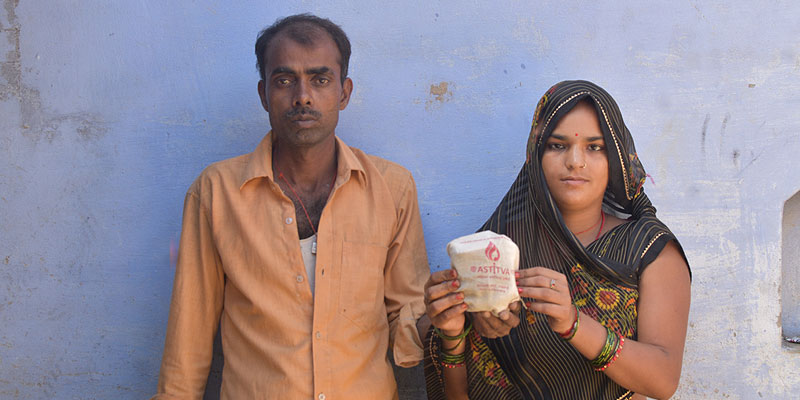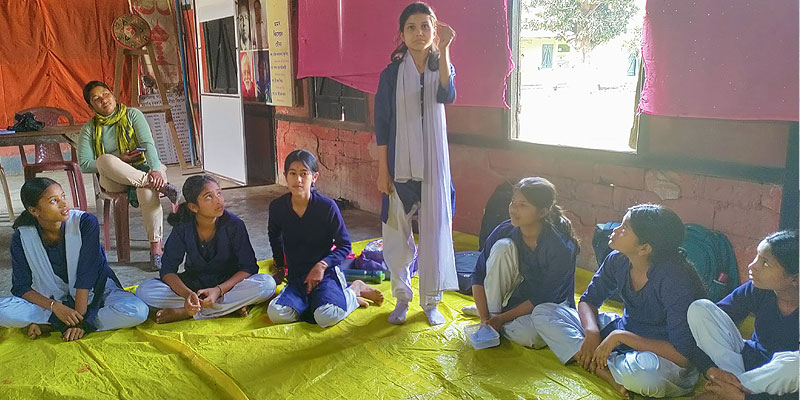
By the time Najma’s daughters entered their adolescence, she was clear that they would not undergo the same struggles that she had faced. The resident of Kaiserganj block, Uttar Pradesh, recalls her own adolescence – and the silence around menstruation. With no knowledge of human biology nor anyone to guide her, she had been forced to navigate the complexities of menstruation by herself.
Najma’s case is not unique. About 336 million women and girls in India are of menstruating age. That accounts for nearly a quarter of the population. Yet, even today, a majority of them face health and social challenges arising from a lack of knowledge and social stigma surrounding this entirely natural biological process. Cultural taboos and the lack of proper infrastructure have long hindered menstrual health and hygiene management in India. These taboos impact not only women’s health and quality of life, but also their mobility and agency.
Managing menstruation is yet another challenge. The lack of access to sanitary products and their pricing, coupled with lack of access to WaSH facilities and the inability to safely dispose of used sanitary products all combine to pose a serious threat to women’s health.
Understanding that women’s health not only impacts family stability but also societal development and a country’s socio-economic indices, the Tata Trusts embarked on a new initiative in 2018 – the Menstrual Health and Hygiene Management (MHM) programme as an integral part of their WaSH programme. The MHM programme was initiated based on feedback received from women by the Trusts team, and it takes forward the concepts of sanitation and hygiene and integrates them into essential development aspects such as community health and reproductive health.
The pilot programme was launched in two states – Uttarakhand and Rajasthan. By 2025, the initiative encompassed eight states, led by a committed team that gathered information about menstrual health and hygiene at the grassroots.
An EPIC approach
As always, the Trusts believe in a multi-pronged approach to MHM that addresses interconnected issues such as menstrual awareness, gender iniquity, access to hygiene and sustainable sanitary products, and safe menstrual waste management. The Trusts use the EPIC model to MHM which has four key objectives:
- Encouraging equitable gender norms through behavioural change
- Promoting social entrepreneurship
- Inculcating safe and hygienic habits
- Creating awareness for responsible disposal
The Trusts believe that behavioural change is central to achieving these objectives. As such, the EPIC model aims to create sustainable change in the community, and the Trusts have developed training modules to build awareness among girls and women. These training sessions teach women about their bodies, the biology of menstruation and the reproductive system. They also gain valuable information on nutrition and menstrual management products that help them make informed choices.
Empowering behavioural change
In order to help her daughters navigate this complex issue, Najma began attending MHM training sessions. “I found these sessions very useful,” says Najma, shyly. “They helped to break the silence around menstruation, and fostered open dialogue and understanding among the women in my community.” This open communication helps to dispel myths and taboos about menstruation and empowers women to speak up, thus adding momentum to societal change.
Inspired by what she learnt during these sessions, Najma not only embraced eco-friendly menstrual products but also took the initiative to create a home-made backyard disposal mechanism known as a ‘matka’ incinerator [burning chamber] – a safe and sustainable method of disposing sanitary waste.
Encouraging societal change
Women's empowerment can only happen when communities change and when societal norms change. The Trusts’ efforts are geared to create these changes at both micro and macro levels. Engaging with the larger community by addressing the issue of menstruation at community health camps, having doctors address the community and encouraging local leaders to speak up help to raise awareness and bring women’s issues to the forefront. At a micro level, the MHM programme holds couples counselling sessions to encourage women to discuss menstruation with their spouses. This raises men’s awareness of menstruation and the problems that women face during this period.
The MHM programme also targets adolescent boys and girls to help normalise puberty and to create an enabling environment that allows young girls to manage their menstruation better. These sessions help create an openness around the topic and helps dispel common misconceptions around the topic.
The Trusts are also working to raise awareness of the need for more environmentally sustainable sanitary products. In Amravati, Maharashtra, the Trusts’ associate organisation, Collectives for Integrated Livelihood Initiatives (CInI), has been promoting the MHHM initiative. In this tribal district, 17-year-old Vaishnavi is leading the charge to break the silence around menstruation. Dismayed by the lack of a disposal system to safely dispose of used menstrual products, Vaishnavi, whose mother is a community resource person, embraced the use of menstrual cups as a cleaner, greener alternative. Her decision has encouraged her friends to join the movement.
Walking the talk
Apart from training sessions and awareness campaigns, the Trusts are promoting the MHM initiative by encouraging women’s self-help groups to set up production units for sanitary products at village and block levels. Since localisation of supply is crucial to ensure regular and affordable supplies of sanitary products, the Trusts trained girls and women to stitch reusable cloth pads. Reusable cloth pad manufacturing units were also set up in Uttar Pradesh, Rajasthan and Maharashtra.
The Trusts are also committed to promoting cost-effective and alternate technological solutions that can be managed by local communities. The Tata Water Mission team popularised the use of the innovative matka incinerators to ensure the easy and hygienic disposal of used menstrual absorbents. Since an earthen pot is the sole requirement for this intervention, rural communities find it easy to use.
The Trusts also initiate community outreach, using community research persons or social mobilizers/sakhis to engage with local communities and disseminate knowledge on menstrual health and its management. Teams engage with local school authorities to raise awareness among pre-pubescent and adolescent girls, and break the taboos and the silence surrounding the topic. Since stakeholder buy-in is a crucial component to sustain the MHM programme, the Trusts also engage with government bodies from village panchayats to various ministries and government departments.
Impact and beyond
The results of the Trusts’ MHM programme have been encouraging. Awareness about female biology and menstruation has risen to 97%, while the percentage of women who espouse positive change against social taboos has more than doubled. There is greater awareness of the need for community-scale menstrual health management. The MHM programme has also led to an improvement in health-seeking behaviour among women, who are now more open to talking about MHM-related issues.
In Assam, the MHM intervention in the Chaygaon and Boko blocks of rural Kamrup focused on educating adolescent girls and boys as well as men and women through awareness and information sessions. By providing them a platform to discuss the topic of menstruation freely and openly and giving girls and women a safe space to ask questions about menstruation or clarify doubts about their own bodies, the Trusts provide the opportunity for communities to unlearn and learn anew. The impact of such an intervention is beneficial in critical ways that allow young girls and women to break out of the confines of societal taboos and menstrual myths and to grow and flourish.
Jayshree Medhi, an 8th standard student from MVS school, Chaygaon, has attended all four MHM modules. Though curious, she had never had an opportunity to learn more about menstruation. Neither her mother nor her teachers ever discussed the topic. The MHM sessions helped clear her doubts and taught her a lot about this normal biological function. She learnt that menstrual blood was not ‘impure’ and that it was not necessary to stay at home when she had her periods as her mother insisted. Nor were certain foods prohibited during menstruation. Armed with this knowledge, Jayshree was determined to convince her mother so that she wouldn’t remain a victim of outdated myths and taboos centred around menstruation.
Much has been achieved; much still needs to be done. The Trusts’ impact study has shown that sustained messaging on social norms is needed to address the barriers still standing. Awareness of MHM programmes must be compulsorily paired with the availability of affordable products. Pricing is still a crucial barrier to the use of alternatives to cloth pads. Disposal of used menstrual absorbents also remains a critical issue. The Trusts aim to delve into using advanced technologies that are economical, accessible and environment-friendly to address the disposal of used menstrual products.
Note: Names have been changed to protect the privacy of individuals.



